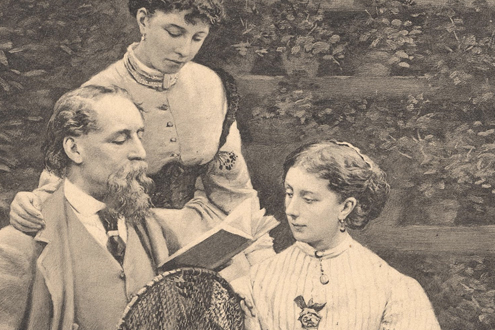
Richard Lederer on Remembering the Great Charles Dickens
Two centuries ago — on February 7, 1812 — Charles John Huffam Dickens entered the earthly stage. Born into an impoverished family, his father having served a term in debtor’s prison, Charles worked as a child slave in a London blacking factory.
The rags-to-riches life of Charles Dickens’s was more remarkable than any of his stories. From such unpromising origins, he arose to become the best-selling writer of his time and one of the most enduring and quotable writers of all time.
What has been described as the most successful writing career in history was launched when Dickens was 24. On March 31, 1836, he published the first installment of a comic novel about a bunch of bumbling gentlemen who knock about England getting into various scrapes. At the center of the group was one of the greatest comedy teams in all literature — Samuel Pickwick, a fat retired businessman, and a jaunty young cockney by the name of Sam Weller. The novel emerged as The Posthumous Papers of the Pickwick Club, popularly known as The Pickwick Papers.
Following Pickwick came 14 more enormously popular novels, from The Adventures of Oliver Twist, or the Parish Boy’s Progress, to the unfinished The Mystery of Edwin Drood, and hundreds of stories, including “A Christmas Carol.”
How did Dickens do it? First and foremost, he possessed a preternatural feel and ear for the hum and buzz of human life. People and situations endlessly flared up in his imagination; he said he could literally hear what his characters said before he wrote the words down. A supporting cast of more than 300 fantastic bit players floats in and out of Pickwick; over his career, Dickens gave birth to thousands of characters.
Dickens not only wrote about people; he spoke to the people, who gobbled up every one of his books and stories. Like most of his works, The Old Curiosity Shop (1841) was published in serial form. The novel won a vast readership on both sides of the Atlantic, and, as interest in the fate of the heroine, Little Nell, grew intense, circulation reached the staggering figure of 100,000. In New York, 6,000 people crowded the wharf where the ship carrying the final Master Humphrey’s Clock magazine installment was due to dock. As it approached, the crowd’s impatience grew to such a pitch that they surged forward and cried out as one to the sailors, “Does Little Nell die?”
Alas, Little Nell did die, and tens of thousands of readers’ hearts shattered. The often ferocious literary critic Lord Jeffrey was found weeping with his head on his library table. “You’ll be sorry to hear,” he sobbed to a friend, “that little Nelly, Boz’s little Nelly, is dead.” Daniel O’Connell, an Irish MP, burst out crying, “He should not have killed her,” and then, in anguish, threw the book out of the window of the train in which he was traveling. A diary of the time records another reader lamenting, “The villain! The rascal! The bloodthirsty scoundrel! He killed my little Nell! He killed my sweet little child!”
That “bloodthirsty scoundrel” was himself shattered by the loss of his heroine. In a letter to a friend Dickens wrote, “I am the wretchedest of the wretched. It [Nell’s death] casts the most horrible shadow upon me, and it is as much as I can do to keep moving at all. Nobody will miss her like I shall.”
And let us not forget the incredible piston energy that drove the man. His contemporary, Leigh Hunt, said of Dickens: “What a face is his to meet in a drawing room! It has the life and soul in it of 50 human beings.” Dickens did indeed possess the capacity of multitudes for work and play. In addition to pouring forth his literary works, he was a journalist, writer of long and vivacious letters, indefatigable walker, amateur theater producer and actor, and vastly popular lecturer and reader.
James Nathan Miller describes the results of Dickens’s literary empathy and brimming vitality: “Incredibly, Dickens’s career never had a pinnacle. It was all pinnacle. From the appearance of Sam Weller in 1836 to the day in 1870 when Dickens died while writing The Mystery of Edwin Droid, his career was like a Roman candle that went straight up and just hung there, shooting one brilliant shower after another.” We today are still being showered by those sparks, as witness the more than one hundred motion pictures made from Dickens’s works.
No wonder that G.K. Chesterton said of him: “Whatever the word great means, Dickens was what it means.”


